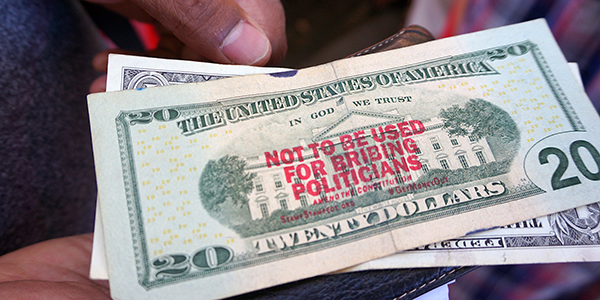Three ways of theorising ‘capture’: when politics and business join together
In the strongest-performing liberal democracies the separation of the political sphere from dominant or directly controlling business influences is protected by a range of ‘blocked exchanges’ (in Michael Walzer’s terms). But in authoritarian regimes, semi-democracies and flawed liberal democracies it is common for business interests to take control of the levers of political power acting alongside top politicians, with a joined-up elite or ‘oligarchy’ thereby ‘capturing’ the state. In different forms, this worldwide phenomenon can be seen from Russia to South Africa and from China to Brazil. Frank Vibert outlines three ways of looking at these situations, and stresses the difficulty of identifying and implementing a cure.

Campaign to ‘get money out of politics’. Picture: Kristina D.C. Hoeppner/ (CC BY-SA 2.0) licence
An essential element in the concept of ‘capture’ is that it refers to political power that is acquired outside the legitimate channels for exercising political authority in a society. Businesses are often the prime movers in seeking such powers, but politicians may also be the instigators of a ‘capture’ relationship with business. Either way, citizens are the likely losers, as all three current models of this process emphasise.
The ‘exchange’ model sees capture as a product of mutual exchange occurring between a dominant politician or set of politicians and business. The politician wants money – for example to fund an election or re-election campaign, to reward their followers, or simply to build their own personal fortune. Businesses want influence over political decisions, and so they do a deal. This model originated in the context of regulation, where state agencies partly or largely depend on quasi-voluntary compliance for regulations to stay up to date and effective. To operate effectively regulators want (and often need) a wide range of information held by businesses. Businesses will accommodate the regulator by offering the information in exchange for influence over regulatory policies and a cosy relationship with the regulator. The advantages of exchanges between actors with different interests can be generalised to apply across politics as a whole.
The ‘joint enterprise’ model by contrast sees politicians and businesses as having the same (essential) goals, and largely recognising that fact. What is good for the business is good also for the country, and vice versa. In this model, the initiative to start a ‘capture’ relationship may come from a dominant politician or set of politicians, who want the material and wealth rewards that business can offer for themselves or their associates. Naturally enough, though, political actors wrap up such motivations within a narrative for public consumption, which forcefully claims that the public interest is also being served when the goals of politics also help the goals of business. For example, China’s government talks about the benefits of rising prosperity for all, while drawing a veil over the relationship between the political leadership and business leadership.
The ‘constitutional’ model can be traced back to James Madison and the founding of American democracy at the end of the 18th century. Madison saw an inherent tension in a democracy between giving power to the people and an equal need to respect property rights. On the one hand there was a danger that a populist majority could seize businesses and land. On the other hand, there was a danger that over-powerful property and business interests could use political power for their own ends. His constitutional ‘solution’ lay in a system of checks and balances where the executive power and the legislative power held each other in check and an independent judiciary held the ring. ‘Capture’ could occur when these checks failed.
Different diagnoses – different ‘remedies’
These different ways of looking at capture lead towards different remedies. In the first, exchange model, it may be possible in liberal democracies to break the connection between business money and elections by limiting permissible election expenses, and also by making political donations fully transparent so that shareholders can object.
The enterprise model is more difficult to address. Some exponents of this approach favour privatisation as one type of preventative measure, opening up previously ‘captured’ industries to more normal business competition pressures. At the same time, however, privatisation can be used by politicians to reward followers and to build channels for remuneration (as has occurred in Russia). At the least, strong standards of corporate governance are called for.
The constitutional model calls for an identification of weak spots within a country’s constitution and action to fix them. In many countries the problem may originate with weak electoral processes and a deficient civil society unable to effectively criticise policy-makers. There are insufficient channels for citizens to show their disapproval, get rid of the politicians or mobilise the strong pressures needed to achieve constitutional reform.
However it originates, ‘capture’ undermines the institutions of both politics and the market. The exchange model points to how capture can destroy trust in each. The enterprise model suggests how both elites focus on shared power or wealth-aggrandisement goals can destroy the wider values of political association relating to the character of a society. The constitutional model points to the fragility of checks and balances, and their costs when they insulate ‘capture’ relations from being changed.
One general lesson from the study of ‘capture’ situations is that when we think about the rules that constitute a democratic society they should include rules of corporate governance fully alongside the more familiar ‘democratic’ rules, for example, governing how we elect legislatures and assemblies.
The post gives the views of its author, not the position of Democratic Audit.
About the author

Frank Vibert was a senior visiting fellow in the Department of Government (LSE) between 2008–2019 and is now associate with CARR (LSE) and fellow of the Foundation for Law Justice and Society, Wolfson College, Oxford. He won an Open History Scholarship to Exeter College, Oxford and obtained a first class degree in Philosophy, Politics and Economics (PPE). He has been a senior advisor at the World Bank in Washington DC and a senior fellow at UNU/WIDER in Helsinki. He co-founded and was director of a London based think tank, the European Policy Forum, between 1992 and 2008. His main fields of interest are constitutional theory and regulatory governance, including international governance and the European Union. You can read more work by Frank Vibert at vibertview.net.





 Democratic Audit's core funding is provided by the Joseph Rowntree Charitable Trust. Additional funding is provided by the London School of Economics.
Democratic Audit's core funding is provided by the Joseph Rowntree Charitable Trust. Additional funding is provided by the London School of Economics.